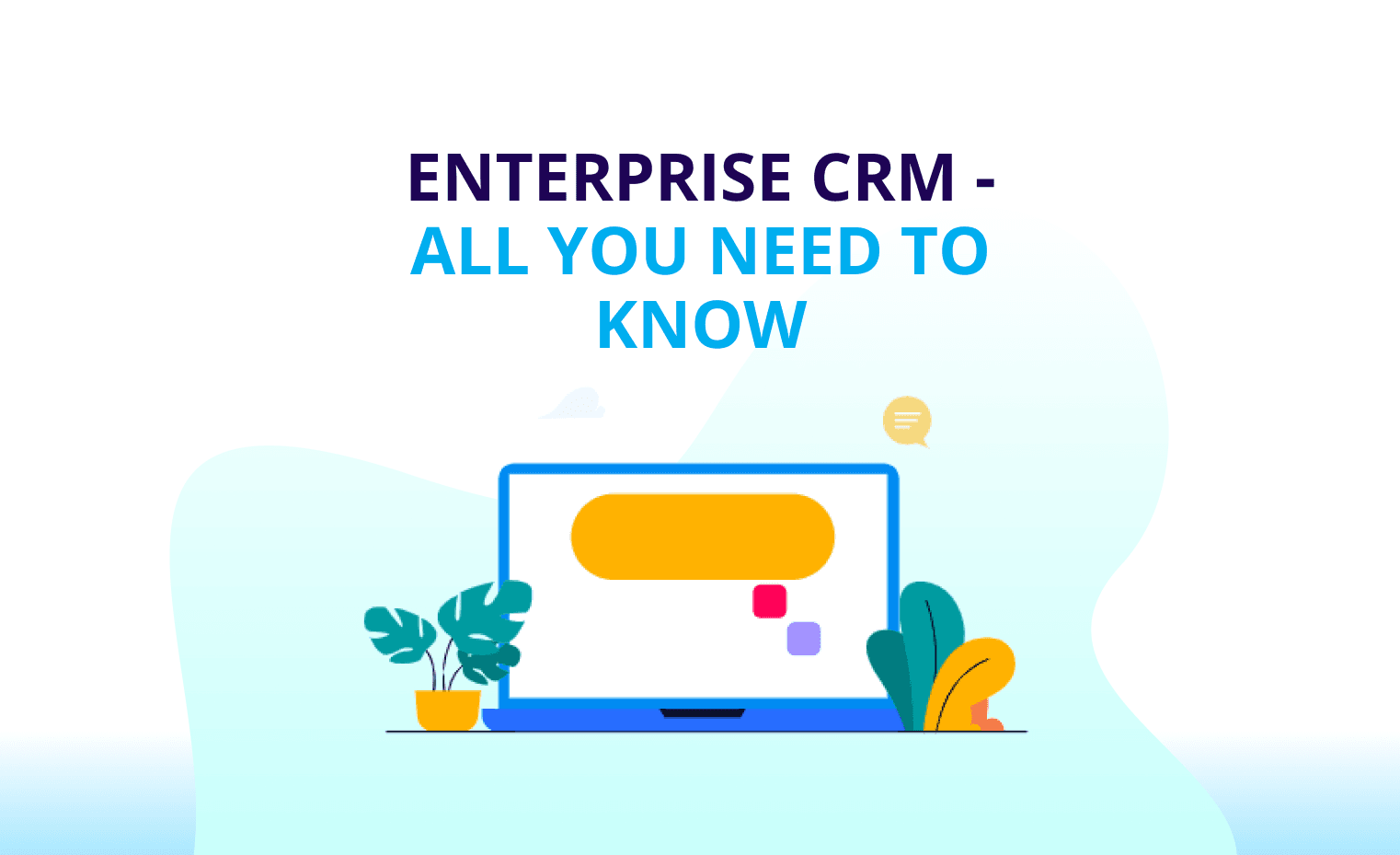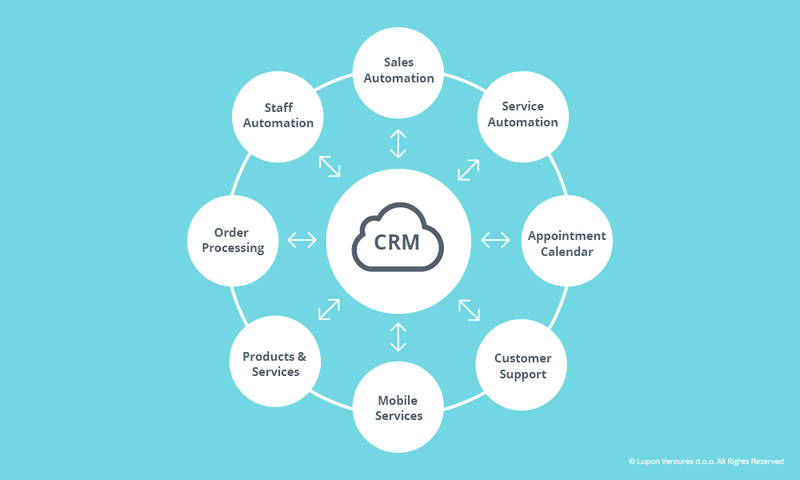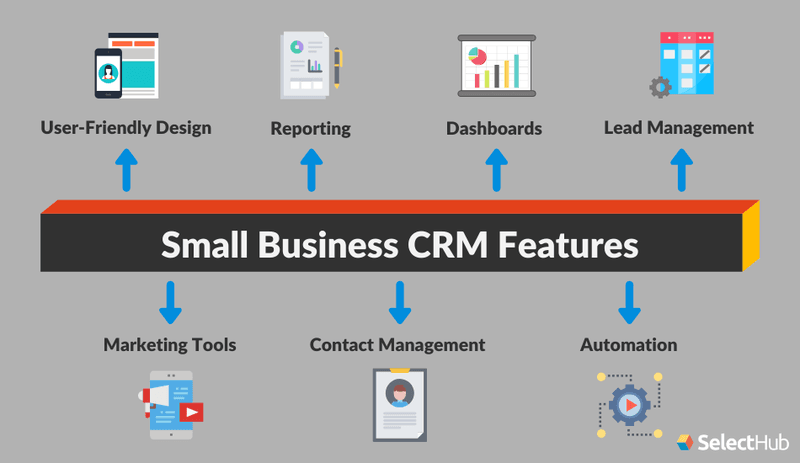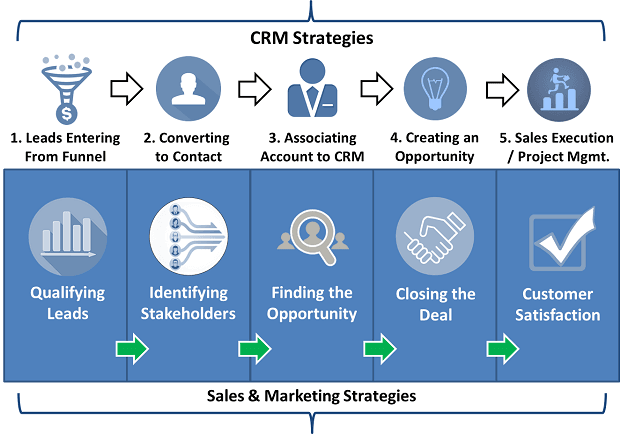
It's easy to get lost in the world of CRM systems. How can you possibly know what you need when there are so many suppliers, solutions, and features on the market?

This article will clear up any misconceptions you may have about what an enterprise CRM is and how it differs from a regular CRM.
CRM, or Customer Relationship Management, is a software program that helps you manage your customer database, communication, and sales forecasting while streamlining your sales process.
A CRM service can help all sorts of businesses keep track of their client connections. CRM implementation has resulted in continuous development in a range of organizations, ranging from small enterprises to big conglomerates, non-profits to large real estate companies.
You'll not only improve client happiness with a CRM, but you'll also be able to boost your sales and manage your income with more convenience.
To understand the impact of CRM on Enterprises, we must first comprehend how they are used for small to mid-sized businesses. For instance, CRM solutions have exploded in popularity among SMEs in recent years, owing to their low pricing.
As a result, there are a plethora of solutions on the market aimed specifically at smaller, less sophisticated businesses.
In most SMEs, we find that the in-house sales and marketing teams handle the majority of client contacts. As a result, smaller CRM providers tend to concentrate on the needs of salespeople, including calendars, contact management, and email marketing.
Smaller CRM systems are usually provided on a monthly per-user basis, allowing the customer to scale up by adding more workers to the contract. You may also discover "freemium" versions, but be wary of hidden costs - some suppliers charge additional payments to get the implementation up and running or to have access to customer care.
An enterprise CRM is just a more comprehensive CRM system. An enterprise CRM is built for bigger businesses with complex business demands, and it aids in the coordination of cross-functional activities that directly affect sales and customer support.
An enterprise platform is deemed suitable for businesses with many departments and teams that rely on real-time CRM data.

Aside from resolving supply chain issues, recording client contacts, and managing lead creation, the program provides sales and marketing teams with a variety of user profiles.
CRMs developed for corporate firms are frequently jam-packed with features since they're meant to manage a variety of complicated activities, data, and processes. The following are a few of the most common -
The cost of corporate CRM systems is obviously much greater than the cost of a regular CRM. The increased cost, on the other hand, might be ascribed to the time and people necessary to develop and install a solution to your precise requirements.
The extra price includes comprehensive support, which ensures that you have a consistent point of contact to assist you with any unforeseen problems or implementation concerns.
Simply put, an enterprise CRM system allows workers who engage directly with prospects and clients to collaborate and share information. Sales and marketing employees, accounting personnel, help desk teams, call-center representatives, and others are all examples of this.
You can provide third-party sales channel partners access to all of the benefits of a CRM with a system like this, due to communication and coordination capabilities that extend beyond the company's boundaries.
Above all, an enterprise platform aids in the centralization of reliable, real-time client data. With this data, you may allow all customer-facing personnel to get insights into client habits and understand their interests, resulting in more educated and intelligent interactions that improve customer experiences.
Enterprise CRM systems differ significantly from their smaller-scale equivalents in a number of ways. The majority of these distinctions directly address the complexity of administering a large organization vs a small one.

An enterprise CRM is designed for larger businesses with more complex requirements. These businesses frequently have many departments and teams, all of which rely on fast access to the information stored in your CRM. And, when utilized appropriately, your corporate CRM may automate tasks like tracking customer contacts or resolving supply chain issues.
It will also improve cooperation and information sharing among all workers who interact with clients - not only sales and marketing, but also your accounting team, help desk, and customer support department - by coordinating sales-related operations.
In a nutshell, an enterprise solution will organize client data and enable everyone to manage the sales process more effectively.
An enterprise CRM, on the other hand, will be significantly more expensive than a regular CRM. The cost can be entirely justified for many organizations.
The majority of the expense is due to the time and effort required to tailor the solution to your specific needs and requirements before distributing it across your organization. This implies that your CRM, which is personalized to your specific needs, will streamline processes and activities in the future, saving you time and money.
Furthermore, a larger price tag may contain more comprehensive support, implying that your vendor will always have someone available to assist you with any unforeseen problem, implementation, or training day.
Customer-facing procedures are significantly more complicated and multi-faceted in many larger businesses. Interacting with and servicing both existing and future clients is the responsibility of departments and employees within the company.
This means the CRM system they choose and install must automate and support all of these workers' activities, track activity histories from beginning to finish, and make that information readily available to other customer-facing employees throughout the company.
An enterprise CRM system accomplishes precisely that.
It unifies all cross-functional processes that affect customer sales and service, as well as collaboration and information sharing among all employees who interact directly with prospects and clients – not just sales and marketing personnel, but also help desk teams, accounting personnel, call-center representatives, and others.

Furthermore, with enterprise CRM, that sort of communication and coordination goes beyond the company's walls, allowing third-party sales channel partners and other external customer-facing components to take advantage of the CRM system's full capabilities.
Enterprise CRM, most crucially, centralizes reliable, real-time customer data. This enables everyone in a customer-facing job to get insight into consumer behavior and better understand their requirements and interests. As a consequence, interactions will be more informed and smarter, and the customer experience will be enhanced across all contact points.
Huge systems, by definition, entail big difficulties. Although enterprise CRMs offer better coordination of sales, marketing, and service operations as well as increased efficiency, they also come with a hefty price tag.
While nearly every cloud-based business CRM only requires registration to get started, it requires considerably more to get it up and running on a large scale.
You'll need to pick the right platform, get everyone's buy-in, involve your IT team or hire technical experts to migrate your data, customize the new system, integrate third-party sources, develop apps and custom connectors, build workflows and machine learning models, organize training to increase adoption rates, and more.
Each milestone may incur additional expenditures and become its own project. All of these activities, however, do not ensure that you will receive the results you want, especially in the near term.
The most common cause of rework, which incurs additional costs and effort, is hasty implementation. Avoid falling into this trap by hiring CRM experts to evaluate your present tech stack, estimate the time and resources required for CRM installation, and compare investments to the expected ROI.
Spend time developing a CRM strategy, considering each stage of implementation as a mini-project with its own goals, team, budget, timelines, and success indicators. This way, you'll be able to acquire an accurate estimate of your project's duration and cost, prioritize features for execution and uncover further cost-cutting options.
Any enterprise CRM deployment project must include data migration as a key component. When migrating from a traditional system to the cloud, you may need to migrate storage, databases, apps, or all of them at the same time.
It necessitates specific technology, data governance, and unique project architecture. Otherwise, a rash approach to this task might result in significant data loss, security holes, and performance bottlenecks.
Similar to CRM deployment, you'll need to devise a data migration plan to expedite the process and guarantee that only important, high-quality data is transferred.
Even if you have an in-house IT team, it may not be enough to deploy enterprise CRM. Developers who have never worked with a CRM platform before may find it difficult to build the system in a cost- and time-effective manner. Furthermore, you may require specialized knowledge, such as that of data scientists.
Hire specialized developers or work with a CRM installation partner with a track record of comparable projects and a large team of skilled specialists. Or, simply book a call with PolyUno today.
Employees may find enterprise CRM solutions daunting in terms of UI, functionality, and the needed degree of tech knowledge. They can sabotage adoption by reverting to old tools, neglecting to enter essential data, or considering it as a necessary evil that doesn't help them in any way if they don't believe they can utilize the new system efficiently.
Involve prospective CRM users early in the planning process to learn about their workflows and tools. Allow them to try the features in a sandbox so that when the system is launched, it will seem familiar.
Develop role-based training sessions with real-world situations, appoint CRM ambassadors to each team to drive adoption and demonstrate how the system can be beneficial, and employ an administrator to offer continuous support during and after the adoption.
When you see that any of your employees have knowledge gaps that are affecting their productivity, consider holding refresher training sessions.
At the end of the day, the decision to acquire a solution is completely based on the size of your business and your long-term goals. A basic CRM system will undoubtedly be the best for SMEs without any big goals in the short term. It's an excellent choice for growing sales in a smaller company because of the lower price point.
If, on the other hand, you have numerous departments that deal directly with consumers, all of your employees must have access to the same information. An enterprise CRM is, without a doubt, a costly option. However, it will ultimately pay for itself through increased customer service and revenue.